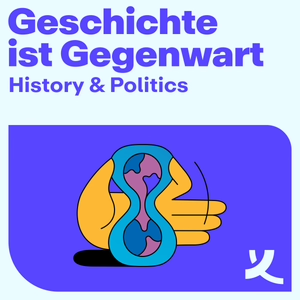
The Impact of Collaboration Between Community Colleges and Civic Partnerships with Dakota Pawlicki and Elaine Morgan
10/24/24 • 44 min
In part one of the final episode of this series, Michelle met with Dakota Pawlicki, Director of Talent Hubs with CivicLab. In this role, he serves exemplary cross-sector partnerships focused on postsecondary attainment that have met rigorous standards for partnership health, equity, and systems change. He brings his expertise in postsecondary education, collective impact, stakeholder engagement, and change management to a network of nearly 100 partnerships, supporting their efforts to improve the human condition. Dakota also hosts Lumina Foundation's podcast Today's Students, Tomorrow's Talent, which features conversations with newsmakers and leaders in the field of learning after high school.
Michelle and Dakota begin the discussion by highlighting the work of CivicLab in advancing civic collaboration and improving postsecondary attainment in communities. He introduces the Talent Hub designation, a marker of an exemplary cross-sector partnership, and emphasizes the importance of context in community collaboration. Pawlicki shares examples of communities that have successfully addressed complex social challenges by redesigning their context and engaging multiple stakeholders. He also highlights the role of collaboration at the community level in addressing barriers to earning a college degree and achieving talent-related goals. Pawlicki advises communities to focus on role clarity, self-determination, and implementing practical solutions before seeking policy changes.
In part two of this episode, Michelle was joined by Elaine M. Morgan, CEO of the Berkeley Chamber of Commerce. Elaine is a fifth-generation Berkeley County, SC, native with over 30 years of leadership experience. She is dedicated to fostering the region's economic growth and community development, working closely with local industries to help them expand, create jobs, and increase wages. Morgan's efforts have had a significant impact, mainly through her close collaboration with elected officials and business leaders to address emerging challenges and opportunities. A cornerstone of her work is the expansion of Community Resource Hubs across the county, offering residents critical services such as workforce training and telehealth.
In this conversation, Michelle Rathman and Elaine discuss innovative initiatives to revitalize rural communities in South Carolina, the importance of collaboration, the establishment of community resource hubs, and the challenges residents face in accessing employment and healthcare. Elaine shares insights on how these hubs are designed to meet the community's needs, the significance of measuring success through community engagement, and the role of policy advocacy in addressing essential needs.
Ascendium sponsors this episode of The Rural Impact podcast, believing that learning after high school transforms lives. Driven by this belief, their philanthropy focuses on systemic change to elevate opportunities for learners from low-income backgrounds. Ascendium has a particular interest in elevating rural postsecondary education and workforce training. They fund research and resources to help ensure more rural learners have pathways to good jobs that lead to upward mobility. Learn more about their Rural Impact at ascendiumphilanthropy.org, sign up for their newsletter, and follow them on social media.
In part one of the final episode of this series, Michelle met with Dakota Pawlicki, Director of Talent Hubs with CivicLab. In this role, he serves exemplary cross-sector partnerships focused on postsecondary attainment that have met rigorous standards for partnership health, equity, and systems change. He brings his expertise in postsecondary education, collective impact, stakeholder engagement, and change management to a network of nearly 100 partnerships, supporting their efforts to improve the human condition. Dakota also hosts Lumina Foundation's podcast Today's Students, Tomorrow's Talent, which features conversations with newsmakers and leaders in the field of learning after high school.
Michelle and Dakota begin the discussion by highlighting the work of CivicLab in advancing civic collaboration and improving postsecondary attainment in communities. He introduces the Talent Hub designation, a marker of an exemplary cross-sector partnership, and emphasizes the importance of context in community collaboration. Pawlicki shares examples of communities that have successfully addressed complex social challenges by redesigning their context and engaging multiple stakeholders. He also highlights the role of collaboration at the community level in addressing barriers to earning a college degree and achieving talent-related goals. Pawlicki advises communities to focus on role clarity, self-determination, and implementing practical solutions before seeking policy changes.
In part two of this episode, Michelle was joined by Elaine M. Morgan, CEO of the Berkeley Chamber of Commerce. Elaine is a fifth-generation Berkeley County, SC, native with over 30 years of leadership experience. She is dedicated to fostering the region's economic growth and community development, working closely with local industries to help them expand, create jobs, and increase wages. Morgan's efforts have had a significant impact, mainly through her close collaboration with elected officials and business leaders to address emerging challenges and opportunities. A cornerstone of her work is the expansion of Community Resource Hubs across the county, offering residents critical services such as workforce training and telehealth.
In this conversation, Michelle Rathman and Elaine discuss innovative initiatives to revitalize rural communities in South Carolina, the importance of collaboration, the establishment of community resource hubs, and the challenges residents face in accessing employment and healthcare. Elaine shares insights on how these hubs are designed to meet the community's needs, the significance of measuring success through community engagement, and the role of policy advocacy in addressing essential needs.
Ascendium sponsors this episode of The Rural Impact podcast, believing that learning after high school transforms lives. Driven by this belief, their philanthropy focuses on systemic change to elevate opportunities for learners from low-income backgrounds. Ascendium has a particular interest in elevating rural postsecondary education and workforce training. They fund research and resources to help ensure more rural learners have pathways to good jobs that lead to upward mobility. Learn more about their Rural Impact at ascendiumphilanthropy.org, sign up for their newsletter, and follow them on social media.
Previous Episode

Expanding Scope and Increasing Hope – The Transformative Role of Community Colleges with Ivy Love, Tiffany Thai and Andrew Koricich, PhD
In part one of the second episode of this series, Michelle met with Senior Policy Analyst Ivy Love and Senior Program Associate Tiffany Thai from the Center on Education & Labor at New America. Ivy Love's work focuses on community colleges, their students, and federal and state policies that support them. Before New America, Love worked as a policy analyst for the Association of Community College Trustees, as a lecturer at Washington University in St. Louis and Webster University, and as a refugee orientation educator at the International Institute of St. Louis. Love is a PhD candidate in higher education administration at Saint Louis University.
Tiffany Thai comes from a first-generation, low-income background. She is passionate about transformational learning and advancing educational equity for marginalized students and their communities.
Michelle, Tiffany, and Ivy explore the critical role of community colleges in providing bachelor's degrees, particularly in rural areas, and discuss the challenges these institutions face, including resistance to program expansion, varying state policies, and the importance of adult learners. They emphasize the need for employer engagement to address workforce shortages and advocate for policies that support community colleges in meeting local educational needs.
In part two of this episode, Michelle was joined by the Executive Director of the Alliance for Research on Regional Colleges and a Professor of Higher Education at Appalachian State University, Dr. Andrew Koricich. His research focuses on postsecondary education issues facing rural communities, with an emphasis on rural-serving postsecondary institutions.
Michelle and Dr. Koricich discuss the benefits of community college bachelor's programs (CCB) from an institutional and policymaker perspective. They highlight how CCBs can help rural community colleges address enrollment drops, build relationships with employers, and meet the workforce needs of their communities. They also emphasize the importance of providing postsecondary options for adults who want to pursue new careers. They also explore rural serving institutions' challenges, such as financial constraints, lack of support, and the need for collaboration and regional partnerships to expand CCB programs.
Ascendium sponsors this episode of The Rural Impact podcast, believing that learning after high school transforms lives. Driven by this belief, their philanthropy focuses on systemic change to elevate opportunities for learners from low-income backgrounds. Ascendium has a particular interest in elevating rural postsecondary education and workforce training. They fund research and resources to help ensure more rural learners have pathways to good jobs that lead to upward mobility. Learn more about their Rural Impact at ascendiumphilanthropy.org, sign up for their newsletter, and follow them on social media.
Next Episode

Disaster Recovery in Rural America with Dr. William Hathaway and Marion Mollegen McFadden
Michelle begins part one of the extra episode with Dr. Bill Hathaway of Mountain Area Health Education Center (MAHEC). Dr. Hathaway and the MAHEC staff of more than 1,000 are committed to transforming rural health and wellness through education, the delivery of patient care, and a focus on community and public health. Before joining MAHEC in early 2022, Dr. Hathaway spent more than two decades working to meaningfully improve health across Western North Carolina as a MAHEC board member, as the chief medical officer for the region’s largest hospital system, and as a practicing cardiologist.
During this conversation, Michelle and Dr. Hathaway discuss the devastating impact of Hurricane Helene on healthcare access in Western North Carolina. Dr. Hathaway highlights the challenges rural healthcare systems face, including infrastructure damage, provider shortages, and the urgent need for recovery efforts. The discussion emphasizes the importance of community support and ongoing efforts to restore healthcare services in the affected areas.
In part two of this episode, the U.S. Department of Housing and Urban Development (HUD) Principal Deputy Assistant Secretary for Community Planning and Development, Marion Mollegen McFadden. In this role, she oversees the administration of federal financial assistance to assist communities in ending homelessness, creating and preserving affordable housing, strengthening local economies, and disaster recovery and mitigation.
Michelle and Marion McFadden discuss HUD’s efforts in disaster recovery, funding initiatives, and housing solutions. They cover the impact of recent hurricanes, the importance of preparedness and resilience, and innovative programs like the Section 108 Legacy Challenge aimed at increasing affordable housing. McFadden emphasizes the need for community engagement and the role of HUD in supporting local jurisdictions to address housing challenges effectively.
The North Carolina Community Health Center Association is now accepting donations for its Disaster Relief Fund to deliver needed support to community health centers and staff impacted by Hurricane Helene.
To learn more visit: https://www.ncchca.org/disaster-donations/
To learn more about the Section 108 Legacy Challenge visit: https://www.hud.gov/program_offices/comm_planning/section108/legacy-challenge
If you like this episode you’ll love
Episode Comments
Featured in these lists
Generate a badge
Get a badge for your website that links back to this episode
<a href="https://goodpods.com/podcasts/the-rural-impact-304628/the-impact-of-collaboration-between-community-colleges-and-civic-partn-76863863"> <img src="https://storage.googleapis.com/goodpods-images-bucket/badges/generic-badge-1.svg" alt="listen to the impact of collaboration between community colleges and civic partnerships with dakota pawlicki and elaine morgan on goodpods" style="width: 225px" /> </a>
Copy





